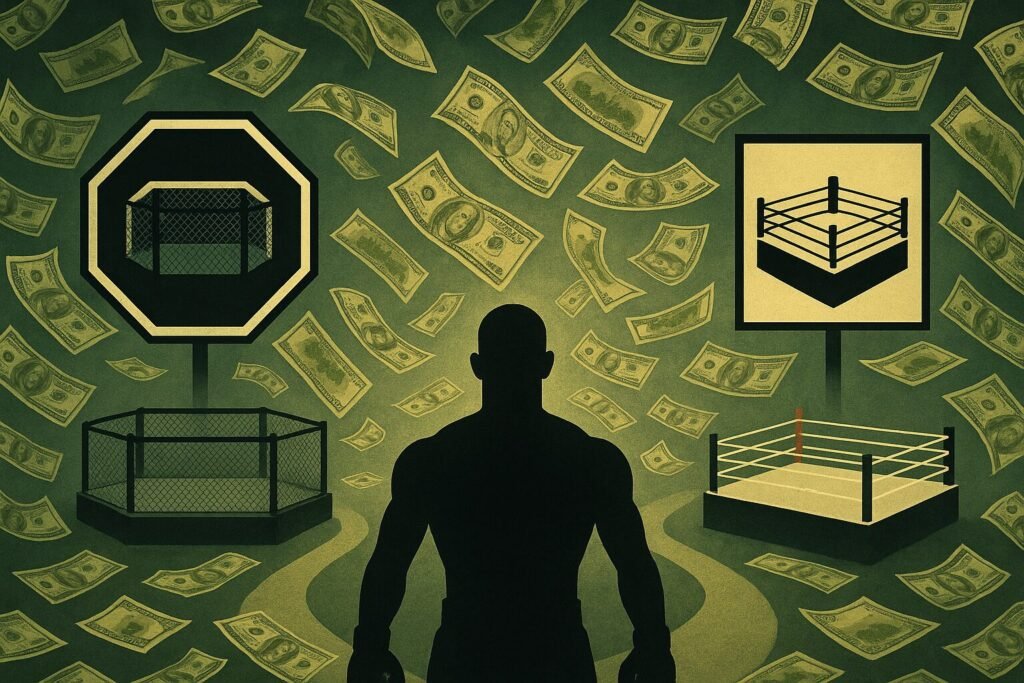Another week, another circus. Wanderlei Silva – a legend in MMA, no question – comes back for a boxing return, and what happens? A disqualification, a post-fight brawl, and the headlines are about everything except the actual fight. That’s what people mean when they talk about Silva boxing chaos – it’s not just the result, it’s the whole show around it that makes you wonder what we’re doing here.
Now, I’ll be honest with you: I don’t even think Silva deserves all the blame. The man’s 48 years old, he’s done his rounds in the cage, and now he’s chasing a payday in the ring. You can’t knock him for that. What you can knock is the system that makes this possible – and worse, profitable.
Why Do They All Do It?
Here’s my theory – and it’s one I know a lot of MMA fans won’t want to hear. The reason so many ex-UFC names jump into boxing is because boxing pays better than the UFC. Simple as that.
Anderson Silva had one of the greatest MMA careers ever, but do I believe he made enough to retire comfortably from it? Not a chance. Stick him in one decent-sized boxing match, and he pockets the kind of cheque that would’ve taken him three UFC fights to earn. That’s the reality.
The UFC loves to talk about being the world’s biggest combat sports brand, and financially they are. TV rights, sponsorship, merchandise – they’ve got money pouring in. But when it comes to fighter pay, they squeeze every penny. If fighters were treated better, would Wanderlei Silva, Tyron Woodley, Vitor Belfort and the rest be putting on the gloves at this stage? Probably not.
Spectacle Over Substance
But here’s where the Silva boxing chaos becomes more than just one fight gone wrong. When the narrative around these events is dominated by scuffles, bizarre refereeing, or weight mismatches, boxing itself suffers.
Yes, these cards bring eyeballs. Yes, they make money. But do they add to boxing’s credibility? Not a chance. The sport already battles against corruption scandals, sanctioning body mess, and fractured titles. The last thing it needs is to become a sideshow for fighters from other codes looking for one last payday.
Could It Be Different?
Imagine if these crossover events were structured properly. Fair matchmaking, clear rules, and fighters actually suited to boxing rather than just famous names thrown together for a quick buck. Then, maybe, there’d be value in it.
But right now, with chaos like Silva’s return, fans are left wondering if this is really boxing or just another extension of sports entertainment.
The UFC’s Part in All This
Here’s the irony – if UFC fighters were paid fairly, a lot of this wouldn’t even happen. Fighters wouldn’t need to risk embarrassing themselves in the ring. They’d retire with dignity.
Dana White and the UFC might claim the brand is bigger than any fighter, but the truth is this: the pay gap between elite boxing and elite MMA is fuelling these spectacles. And as long as that remains the case, we’ll keep seeing chaotic crossover nights that do little for boxing’s image.
The Problem for Boxing
But let’s bring it back to our sport. What does this mean for boxing? Honestly, not much good. Silva boxing chaos isn’t a win for boxing, it’s a win for spectacle. It’s headlines and clicks, not legacy and history.
When the narrative is about brawls and dodgy refereeing instead of the sweet science, fans like me are left frustrated. We already put up with sanctioning body madness, belt confusion, and promoters pulling in different directions. Do we really need crossover farces on top of that?
Sure, these events sell. People tune in. But they don’t stick around. Nobody walks away from a mess like this saying, “I can’t wait to watch the next young featherweight prospect on a Matchroom undercard.” They just laugh, share the chaos on social media, and move on.
Could It Ever Work?
In theory, yeah, it could. If you had fair matchmaking, proper rules, and fighters who actually belonged in a boxing ring, then crossover events might add something. Imagine if Silva had come in, trained like a boxer, fought a competitive opponent, and we got a clean result. That might’ve been worth something.
But that’s not what promoters are selling. They’re selling nostalgia, names, and a bit of chaos. And chaos is exactly what we got.
UFC’s Role in the Mess
Let’s not pretend this is all boxing’s fault. The UFC has created this pipeline. Fighters aren’t paid enough, and when they hit their late 30s and 40s, boxing offers them one last cash grab. If Dana White really wanted to protect his sport’s reputation, he’d pay his fighters properly. Instead, he laughs at them on podcasts and calls boxing dead, all while his ex-champions are headlining “boxing” shows that turn into melees.
Final Word
Silva boxing chaos isn’t going to be remembered as a classic. Nobody’s going to talk about the tactics or the skill. They’re going to remember the shove, the brawl, the nonsense. That’s what gets shared in the pub, not the punches that landed.
And that’s the problem. Spectacle keeps winning over sport. Until boxing decides what it wants to be – the theatre of great fights or the home for every retired MMA fighter looking for a pay bump – we’ll keep seeing nights like this.
So I’ll throw it out to you: do these MMA crossovers help boxing by bringing in fresh eyes, or are they killing the sport’s credibility one chaotic night at a time?
Drop your thoughts below, share this piece with your mates, and for more takes like this head over to CMBoxing.

